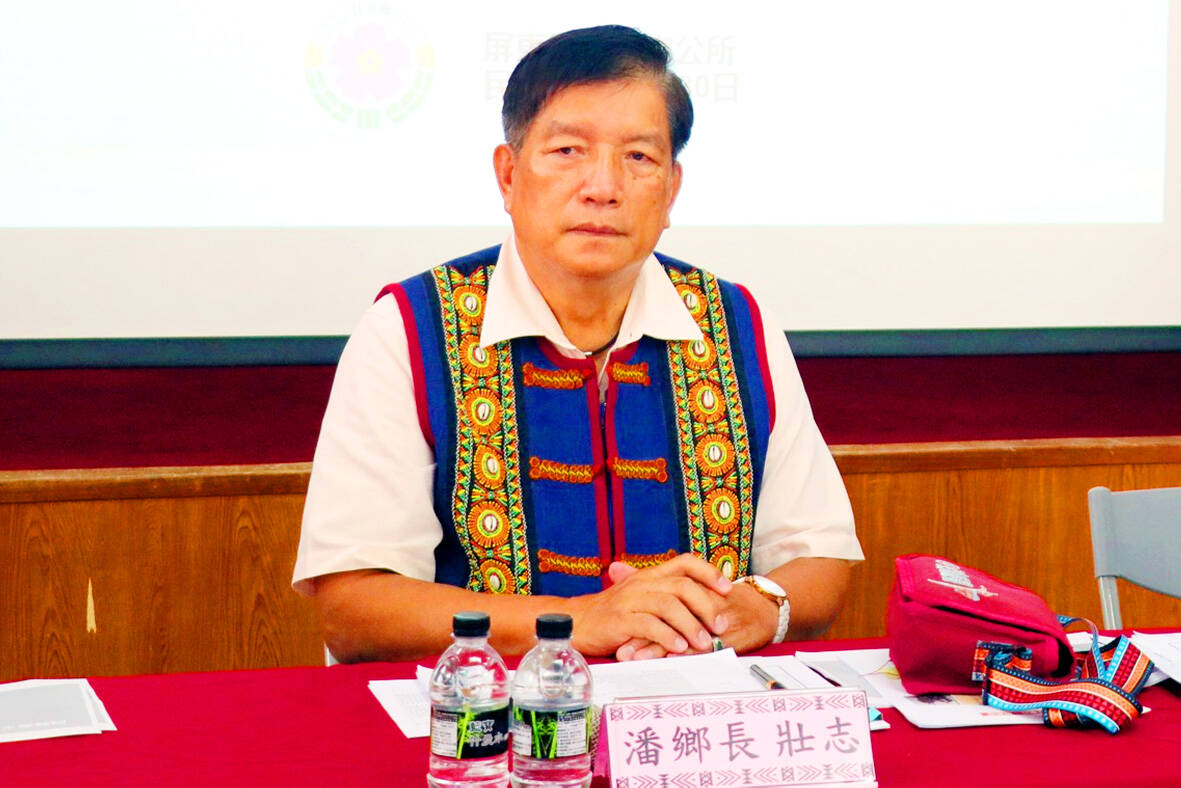The skulls of four Paiwan warriors that were taken by the Japanese during an 1874 punitive expedition known as the Mudan Incident and which are currently housed at Edinburgh University in Scotland are soon to be returned to Taiwan, the Mudan Township Office said.
In a statement yesterday, the office said that according to historical records, the skulls of 12 Paiwan warriors were taken from the Shimen battlefield in Pingtung County by the Japanese in 1874 and taken to Japan and the US.
Four of the skulls eventually ended up in the collection of Edinburgh University, which has indicated in recent years that it would be willing to return them, the office said.

Photo: Taipei Times
Following a series of meetings between local Paiwan groups and the Council of Indigenous Peoples, a delegation including Mudan Township (牡丹) Mayor Pan Chuang-chih (潘壯志), tribal and spiritual leaders, and historians traveled to the UK to inspect the skulls, and a traditional ceremony to mark their return is now being planned, the office said.
A person with knowledge of the matter, but who wished to remain anonymous, said the four skulls were expected to be returned to Taiwan on Sunday.
After their arrival, they are to be sent to the Tainan branch of the National Museum of Prehistory for DNA profiling so that more information about their identities can be discovered, the source said.
The Mudan Incident refers to an 1874 punitive expedition launched by the Japanese in response to the massacre of 54 shipwrecked Ryukyuan sailors by Paiwan warriors three years earlier.
After a major battle with the Paiwan at Shimen in today’s Mudan Township, the Japanese gained the upper hand in the fighting and the Paiwan retreated to the mountains to fight a guerrilla war.
After many Japanese soldiers began coming down with illnesses in the unfamiliar climate, the two sides agreed to a ceasefire and the war came to an end.
The Shimen battlefield site now hosts a memorial park.

‘DENIAL DEFENSE’: The US would increase its military presence with uncrewed ships, and submarines, while boosting defense in the Indo-Pacific, a Pete Hegseth memo said The US is reorienting its military strategy to focus primarily on deterring a potential Chinese invasion of Taiwan, a memo signed by US Secretary of Defense Pete Hegseth showed. The memo also called on Taiwan to increase its defense spending. The document, known as the “Interim National Defense Strategic Guidance,” was distributed this month and detailed the national defense plans of US President Donald Trump’s administration, an article in the Washington Post said on Saturday. It outlines how the US can prepare for a potential war with China and defend itself from threats in the “near abroad,” including Greenland and the Panama

The High Prosecutors’ Office yesterday withdrew an appeal against the acquittal of a former bank manager 22 years after his death, marking Taiwan’s first instance of prosecutors rendering posthumous justice to a wrongfully convicted defendant. Chu Ching-en (諸慶恩) — formerly a manager at the Taipei branch of BNP Paribas — was in 1999 accused by Weng Mao-chung (翁茂鍾), then-president of Chia Her Industrial Co, of forging a request for a fixed deposit of US$10 million by I-Hwa Industrial Co, a subsidiary of Chia Her, which was used as collateral. Chu was ruled not guilty in the first trial, but was found guilty

A wild live dugong was found in Taiwan for the first time in 88 years, after it was accidentally caught by a fisher’s net on Tuesday in Yilan County’s Fenniaolin (粉鳥林). This is the first sighting of the species in Taiwan since 1937, having already been considered “extinct” in the country and considered as “vulnerable” by the International Union for Conservation of Nature. A fisher surnamed Chen (陳) went to Fenniaolin to collect the fish in his netting, but instead caught a 3m long, 500kg dugong. The fisher released the animal back into the wild, not realizing it was an endangered species at

DEADLOCK: As the commission is unable to forum a quorum to review license renewal applications, the channel operators are not at fault and can air past their license date The National Communications Commission (NCC) yesterday said that the Public Television Service (PTS) and 36 other television and radio broadcasters could continue airing, despite the commission’s inability to meet a quorum to review their license renewal applications. The licenses of PTS and the other channels are set to expire between this month and June. The National Communications Commission Organization Act (國家通訊傳播委員會組織法) stipulates that the commission must meet the mandated quorum of four to hold a valid meeting. The seven-member commission currently has only three commissioners. “We have informed the channel operators of the progress we have made in reviewing their license renewal applications, and